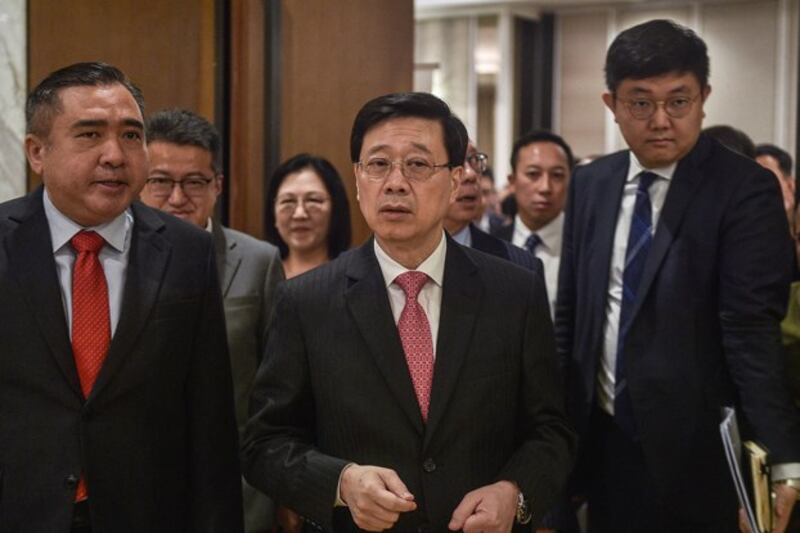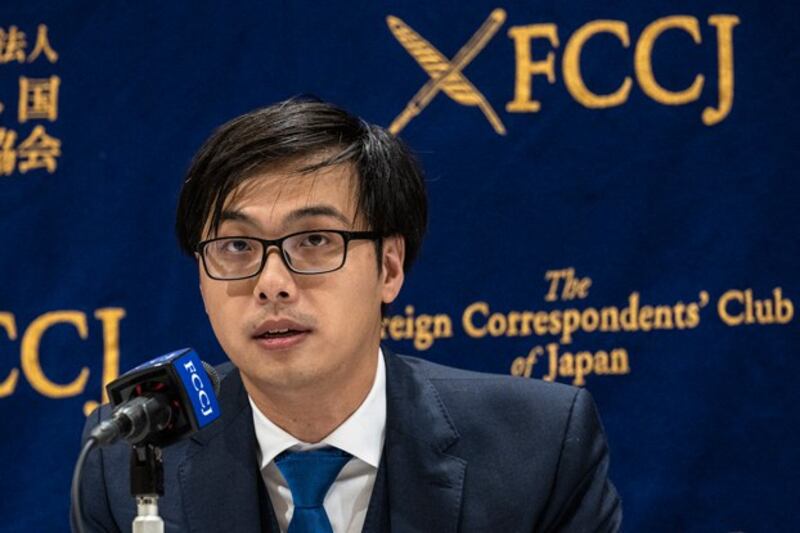Hong Kong security chief Chris Tang has warned that the city will enact more sweeping security laws to 'prevent espionage' that will likely apply to anyone, anywhere in the world, amid an ongoing crackdown on dissent in the wake of the 2019 protest movement.
The 2020 National Security Law, which criminalizes criticism of the authorities as "incitement to hatred of the Hong Kong or central governments" and bans protest slogans and opposition activism as "secession" and "subversion," already applies to anyone of any nationality, anywhere in the world.
Its passing prompted a number of liberal democracies to suspend their extradition agreements with Hong Kong and China, as it has been used to target Hong Kong activists in exile, and even overseas websites the government doesn't like.
Now, Chief Executive John Lee has vowed to 'eradicate the causes' of dissent that he said still lingered in the city despite a 28-month-long crackdown on criticism of the authorities by enacting new security legislation, something the government put on hold following mass protests against the move in 2003.
The new legislation will extend the reach of current laws and guard against "covert rebellions" and "soft resistance," Lee said, warning of "anti-government movements overseas looping back to Hong Kong."
"It's stated in the National Security Law that it has an extraterritorial effect, something that national security laws in other civilized places also have, because people will often infiltrate or endanger national security from elsewhere," Secretary for Security Chris Tang told reporters in comments reported by several media outlets but deleted from official government transcripts.
He said the new legislation will likely focus on cybersecurity and "preventing espionage."

Asked if there were really that many spies, Tang replied: "I think if you had told the people of Hong Kong prior to 2019 that there were spies in Hong Kong, a lot of them wouldn't have believed it."
"Since the black riots of 2019 ... it became clear that there were a great many espionage activities taking place," Tang said, in a reference to the official ruling Chinese Communist Party view that the mass protests against the loss of Hong Kong's promised freedoms were incited by " hostile foreign forces" trying to foment an uprising in the city.
Hong Kong Sanctions Act
"We must strengthen our precautions against espionage," said Tang, who also took aim at U.S. lawmakers for trying to pass the Hong Kong Sanctions Act, which would mandate human rights sanctions against judges and judicial officials linked to the national security crackdown.
Introduced last week, the Hong Kong Sanctions Act, if passed, would give the White House six months to evaluate the officials under the Global Magnitsky and Hong Kong Human Rights and Democracy acts, and to provide explanations if they decline to impose sanctions.
The officials include Justice Secretary Paul Lam, national security chief Sonny Au, Police Commissioner Raymond Siu, chief magistrate Victor So and national security judges Esther Toh and Amanda Woodcock, all of whom have been at the forefront of enforcing the National Security Law.
Tang said the U.S. lawmakers were trying to protect their "running dogs" in Hong Kong, likening the bill to "gangster behavior.”
A spokesman for the Committee for Safeguarding National Security, which is charged by Beijing with implementing the national security law, said in a statement: "The Committee ... expresses strong indignation at and vehemently condemns foreign politicians who spread various false narratives in their rowdy attempt to interfere in the duties of the Hong Kong Special Administrative Region officials, the prosecution functions of the Department of Justice, and the judicial powers exercised independently by the courts."
"Any attempt to interfere will be unpopular and doomed to fail."
'Very unclear' line
Exiled former pro-democracy lawmaker Ted Hui said the new legislation will further erode any difference between Hong Kong's current judicial system and that of mainland China.
"The [new] legislation will cover espionage, which means that if you contact your overseas friends privately and give them information about Hong Kong, this will be seen as espionage, and a betrayal of the Chinese Communist Party," Hui said.
He said the line between what is considered espionage and what is not is currently "very unclear."
"It will have extraterritorial jurisdiction, which coupled with the espionage provisions, makes it a spiced up version of the National Security Law," said Hui, who is among eight overseas activists to have a bounty on his head and warrant out for his arrest under the current law.

"In terms of personal freedoms and safety, the threat will be several times more serious than it is now," he said, adding that anyone saying something in public, or posting content the government doesn't like to social media while overseas, could be prosecuted when they get home.
"Maybe a student attends class and comes into contact with teachers from an institution or school that have ... official backing [from China]," Hui said. "A Zoom conversation or discussion could be incriminating evidence of ... [allegedly] selling information to foreign agents."
A 'more stringent' law
Hong Kong-Japan Alliance spokesperson Sam Yip said it is also likely the government will use the law to target commercial activities, despite Tang's claims.
"The new ... legislation will be ... more stringent than the National Security Law, and the Chinese Communist Party will be able to extend the penalties and have the final say on what constitutes spying behavior," Yip said. "That could be business activities, educational or culture-related behavior, et cetera."
"This will definitely have an impact on foreigners and foreign companies doing business in Hong Kong."
Patrick Poon, human rights consultant and visiting researcher at the University of Tokyo agreed, adding that he worries that lawyers in Hong Kong could soon be treated more like their colleagues in mainland China.
"The thing I'm worried about is whether the legal profession in Hong Kong will be placed under a judicial affairs bureau that will approve all of the lawyers' licenses to practice," Poon said. "It could become very similar to the dilemmas faced by human rights lawyers in mainland China."
"[This would mean that] lawyers could be arrested for representing people like Jimmy Lai, Chow Hang-tung and others like them," he said.
Translated by Luisetta Mudie .
